The idea for last night’s Collab Lab came from Chris Willey after a conversation we had last summer. Chris runs UWM’s Immersive Media Lab, and had recognized that there are a bunch of organizations in Milwaukee doing interesting work in innovation and entrepreneurship at the edges of K-12. He suggested we use one of this season’s Collab Lab as a way to help educators understand what the organizations are up to, and uncover areas for collaboration. We started with a list of organizations– UWM’s Immersive Media Lab, MIAD’s Open Lab, Kohl’s Innovation Center, The Commons, 88.9 Labs, Islands of Brilliance, Brinn Labs, and brought a group together to talk through what this might look like.
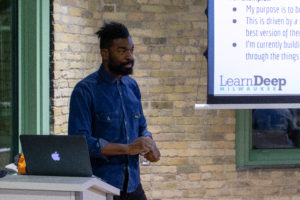 Collab Lab regulars know that our aim is not to talk at attendees, but to foster conversation among them, so a series of presentations was out from the start. Since real collaboration requires alignment of more than just short term interests. Real collaboration comes out not just shared goals, but shared values.
Collab Lab regulars know that our aim is not to talk at attendees, but to foster conversation among them, so a series of presentations was out from the start. Since real collaboration requires alignment of more than just short term interests. Real collaboration comes out not just shared goals, but shared values.
This notion gave us both the first step in our process– having participants describe what it is that drives the work they do– and the idea to have Marvin Pope come in as a guest facilitator. Marvin’s passion is helping others understand and share their purpose, so it was a natural fit. We were delighted that agreed to do so and was willing to work with us to refine the process he’d lead participants through.
Here’s where we landed…
To start, Marvin asked each participant to capture in a sentence or two, their purpose, and the work they do that is guided by that purpose. Participants then shared what they had written, first with whomever they were seated next to, and then within their discussion group. Here’s some of what participants shared:
- I’m on a mission to connect math teachers and transform classrooms
- To facilitate others to become life-long learners
- To expose students to opportunities and experiences
- Helping students and teachers rethink learning through new means of instruction and student centered practices
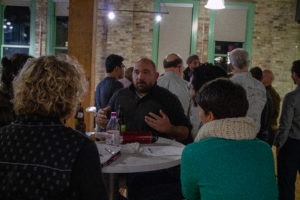 We followed that by asking participants to note what they need to keep moving forward with their work. This too was done first individually, and then shared within the discussion group. One of the goals here was to illustrate that it is not just educators who need help getting to where they want to be. Representatives from each of the organizations were part of each discussion group, and they talked through their purpose, work and needs as well. Here we heard things like:
We followed that by asking participants to note what they need to keep moving forward with their work. This too was done first individually, and then shared within the discussion group. One of the goals here was to illustrate that it is not just educators who need help getting to where they want to be. Representatives from each of the organizations were part of each discussion group, and they talked through their purpose, work and needs as well. Here we heard things like:
- A support system that believes in the work I do
- Teachers willing to collaborate
- Ideas and perspectives that augment my own
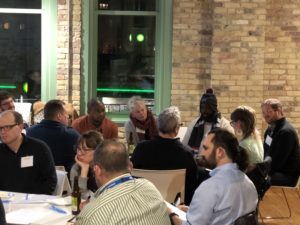 In past sessions when we’ve led discussions about how to move past barriers, these focused on the common barriers to common goals of the participants. Last night we focused on the specific needs of each participant. Participants had been documenting their thoughts on paper form we created for the session. At this point we everyone pass their forms to the right, to gather ideas from each of the other participants within their discussion group. Once those made it all the way around the table, we let the groups talk through what they had written. The most interesting feedback I got was after the session ended when one attendee, commenting on this process noted “I was expecting a lot of You shoulds. What came back was a lot of I can help withs.”
In past sessions when we’ve led discussions about how to move past barriers, these focused on the common barriers to common goals of the participants. Last night we focused on the specific needs of each participant. Participants had been documenting their thoughts on paper form we created for the session. At this point we everyone pass their forms to the right, to gather ideas from each of the other participants within their discussion group. Once those made it all the way around the table, we let the groups talk through what they had written. The most interesting feedback I got was after the session ended when one attendee, commenting on this process noted “I was expecting a lot of You shoulds. What came back was a lot of I can help withs.”
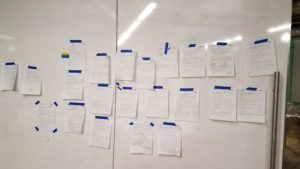 We wrapped up the process by having attendees jot down what their path forward now looks like. At the end, the form they completed, told the story of the purpose behind their work, the hurdles they face, the help they can get within the community, and where that help will take them. We invited participants to share their story with the group as a whole, by posting their form on the wall, or telling their story on a digital voice recorder to be shared more broadly.
We wrapped up the process by having attendees jot down what their path forward now looks like. At the end, the form they completed, told the story of the purpose behind their work, the hurdles they face, the help they can get within the community, and where that help will take them. We invited participants to share their story with the group as a whole, by posting their form on the wall, or telling their story on a digital voice recorder to be shared more broadly.
Sorry, no big, overall summary of the discussion to report, just the good news that the process seemed to spark a lot of ideas around how attendees may work together to get where they want to be.
Thanks again to The Commons for providing the space and to Marvin and our featured participants for the experience and insight they brought to the discussion:
Marvin Pope – BU
Tarik Moody – 88.9 Labs
Bill Pariso, Becki Johnson, Pete Prodoehl – Brinn Labs
Nick Grbavac – The Commons
Mike Klug, Tanmay Mhatre, Josh Delzer – Kohl’s Innovation Center
Mark Fairbanks & Amy Mason – Islands of Brilliance
Chris Willey – UWM’s Immersive Media Lab
Ben Dembroski – MIAD’s Open Lab

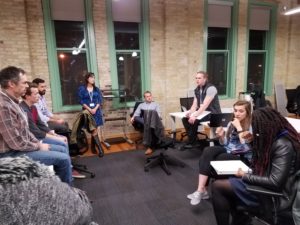
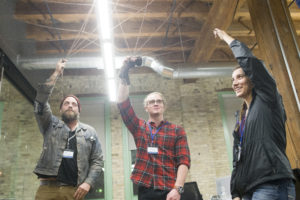 Last night at Ward 4 The Commons revealed the teams for each of this semester’s challenges. After a getting-to-know-each-other exercise that involved great lengths of yarn and a couple of well placed metaphors, the teams got to work. Joost, Mike Cook and I walked our team through the challenge to find a sustainable way excess materials from area firms could be made available for Betty Brinn’s maker initiatives and the makerspaces/FabLabs within area schools. The team’s work for this week is to look at how other organizations have solved the problem.
Last night at Ward 4 The Commons revealed the teams for each of this semester’s challenges. After a getting-to-know-each-other exercise that involved great lengths of yarn and a couple of well placed metaphors, the teams got to work. Joost, Mike Cook and I walked our team through the challenge to find a sustainable way excess materials from area firms could be made available for Betty Brinn’s maker initiatives and the makerspaces/FabLabs within area schools. The team’s work for this week is to look at how other organizations have solved the problem.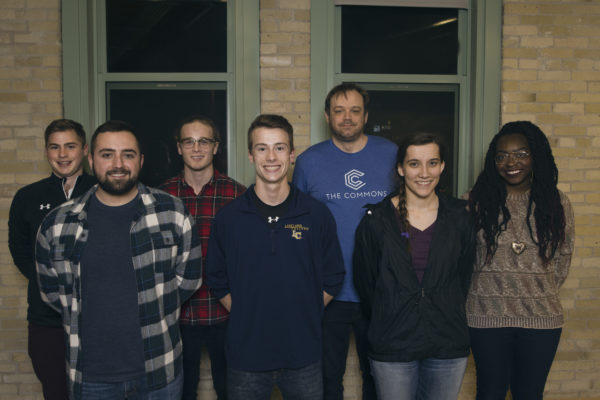
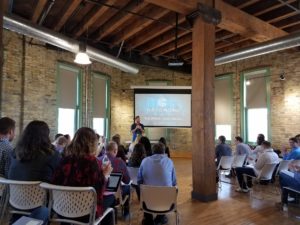 We partnered with Betty Brinn Children’s Museum to formulate this challenge over the past weeks. We are challenging a team to create a pitch for a sustainable startup to provide surplus materials to the Betty Brinn Children’s Museum’s Maker Initiative as well as area school’s maker programs. We spent Sunday afternoon at Ward 4 with Carrie Wettstein and Mike Cook from Betty Brinn to introduce our challenge and meet prospective team members.
We partnered with Betty Brinn Children’s Museum to formulate this challenge over the past weeks. We are challenging a team to create a pitch for a sustainable startup to provide surplus materials to the Betty Brinn Children’s Museum’s Maker Initiative as well as area school’s maker programs. We spent Sunday afternoon at Ward 4 with Carrie Wettstein and Mike Cook from Betty Brinn to introduce our challenge and meet prospective team members.